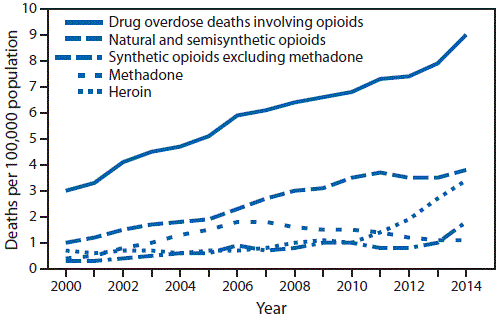The U.S. Food and Drug Administration requested a drug maker to remove a powerful opioid painkiller off the market after finding “the benefits of the drug may no longer outweigh its risks.” This is the first time the FDA has taken action to remove an opioid from the market due to consideration dealing with public health risks of abuse. As such, it may set a precedent for action against other risky opioids.

Opioids, including legal and illegal drugs like heroin, killed more than 33,000 people in 2015, more than any year on record. Nearly half of all opioid overdose deaths involve a prescription opioid.
The Centers for Diseases Control and Prevention is officially calling this an opioid epidemic given the steep rise of abuse rate and death. Since 1999, the number of overdose deaths involving opioids quadrupled and the last 15 years have seen half a million Americans die after abusing these drugs.
An increasing number of people are abusing some of the most powerful prescription opioid painkillers by any means possible, even crushing, dissolving, and then injecting the pills’ contents.
“We are facing an opioid epidemic — a public health crisis, and we must take all necessary steps to reduce the scope of opioid misuse and abuse,” says Dr. Scott Gottlieb, the FDA’s commissioner, meaning business.
“We will continue to take regulatory steps when we see situations where an opioid product’s risks outweigh its benefits, not only for its intended patient population but also in regard to its potential for misuse and abuse.”

Following an extensive investigation, the FDA found a shift in the way reformulated Opana ER (oxymorphone hydrochloride) is used from nasal to injection. Opana ER, a potent extended-release opioid, was approved by the FDA for pain management in 2006. Its widespread abuse around the country has been associated with a serious outbreak of HIV and hepatitis C, as well as cases of a serious blood disorder (thrombotic microangiopathy). Because it’s so strong, a lot of people seek it specifically for non-medical purposes to induce intoxication.
The company behind the drug, Endo, released a reformulated version that should have made the pills harder to crush, dissolve and inject. This proved futile, though. Now, the agency is taking steps to remove the reformulated Opana ER from the market.
“The abuse and manipulation of reformulated Opana ER by injection has resulted in a serious disease outbreak. When we determined that the product had dangerous unintended consequences, we made a decision to request its withdrawal from the market,” said Janet Woodcock, M.D., director of the FDA’s Center for Drug Evaluation and Research. “This action will protect the public from further potential for misuse and abuse of this product.”
Endo reacted to request stating it “feels a strong sense of responsibility to improve the care of pain for patients, while at the same time taking comprehensive steps to minimize the potential misuse of its products,” and is “reviewing the request and is evaluating the full range of potential options.”
Right now, the FDA is kindly requesting Endo to retreat its product voluntarily. Should Endo refuse, the agency stated it intends to take steps to formally require the removal of reformulated Opana ER from the market. Meanwhile, the FDA is also talking to doctors around the country to inform them about the risks associated with the abuse of this product.
“This action will protect the public from further potential for misuse and abuse of this product,” said Dr. Janet Woodcock, director of the FDA’s Center for Drug Evaluation and Research.
Was this helpful?



